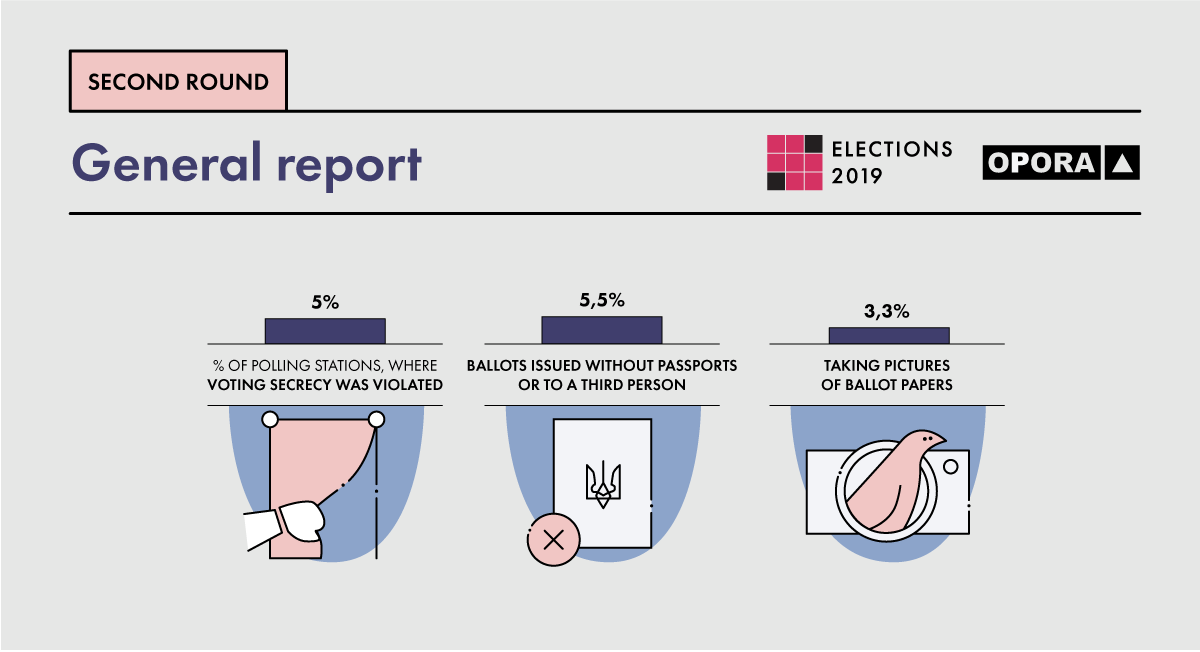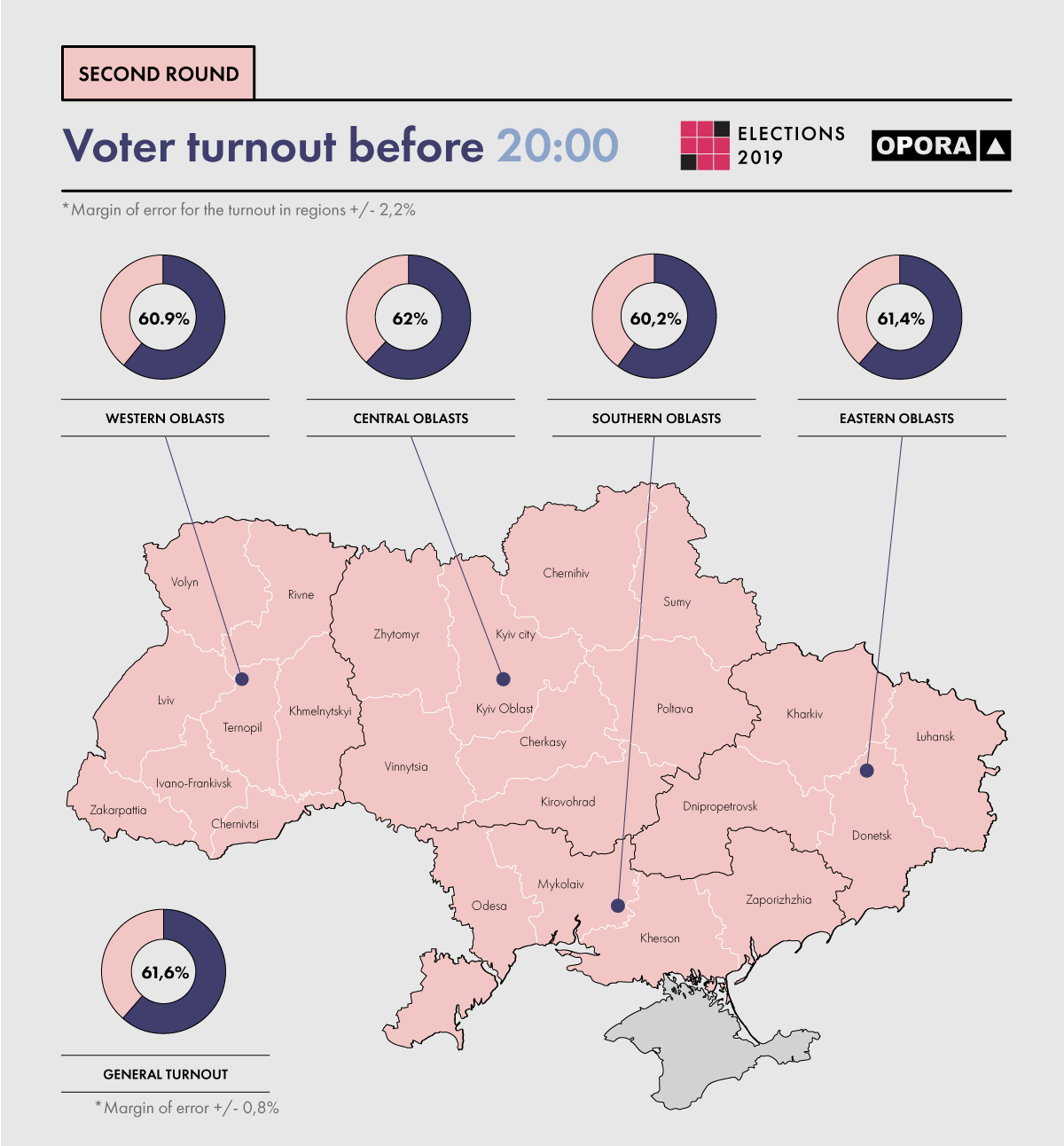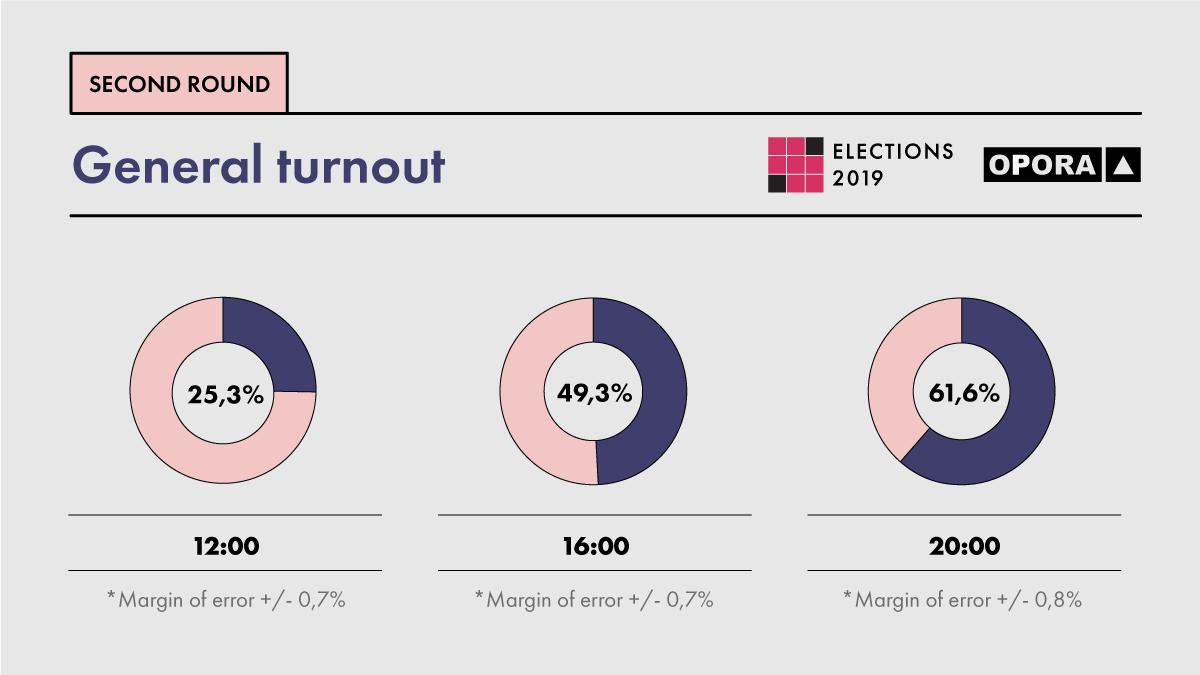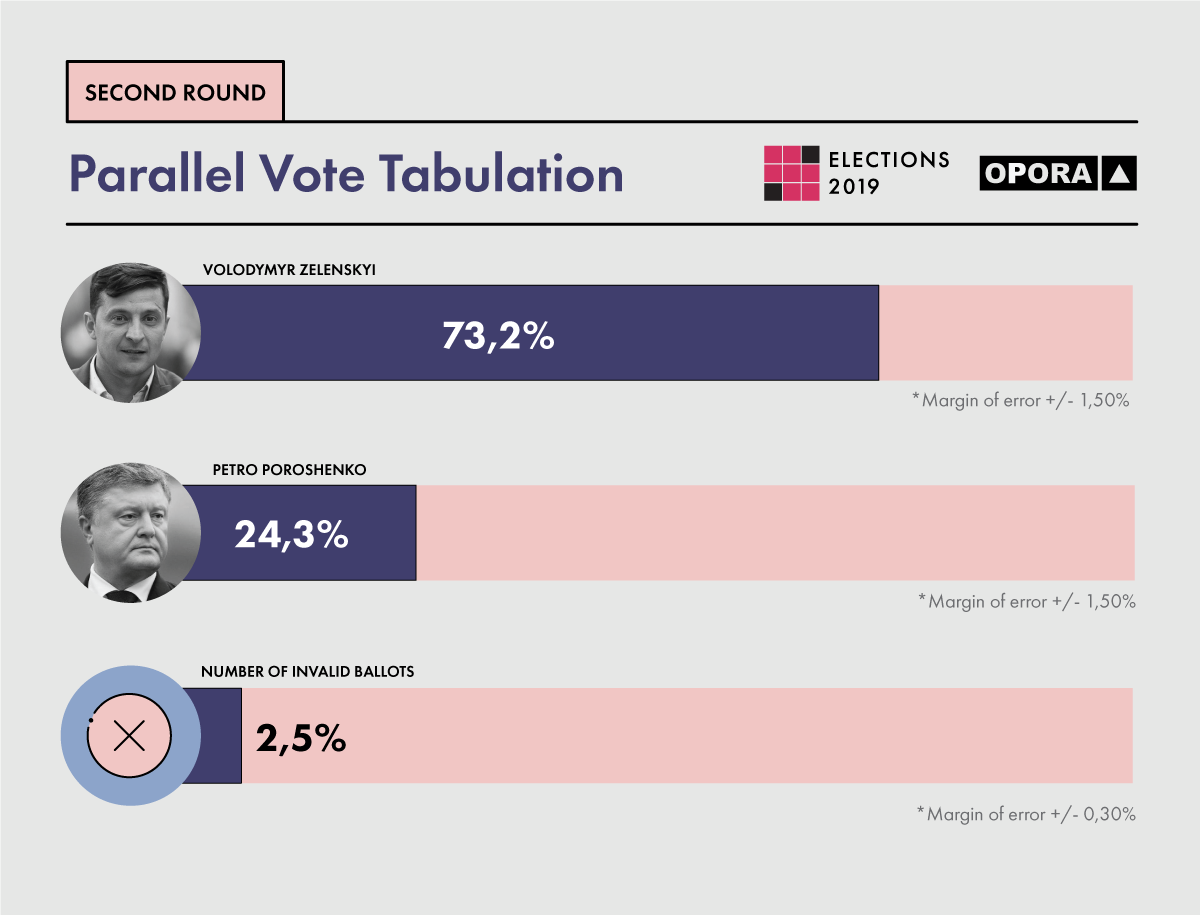On April, 21, 2019, voters had an opportunity to freely elect one of the two run-off candidates who received the most of votes during the first election round. The second round is a final stage of election campaign at the regular presidential election in Ukraine with the record high number of candidates running for presidency (39 persons).
According to the provisional results of the long-term and short-term observation at the regular presidential election in Ukraine (conducted since October, 2018), OPORA states the competitive nature of the electoral process. The voting process and the period of pre-election campaigning mostly complied with the basic international standards of democratic elections.
Voters were comprehensively informed and provided with actual alternatives for expressing their will, which broadly displayed the political parties represented in the society, and reflected the entire range of civic and political attitudes. The state provided citizens with due conditions for exercising their voting rights, with no pressure from authorities or other subjects during the election days on March, 31, and on April, 21.
Candidates resorted to various forms of campaigning, with sufficient and often excessive financial resources therefor. Despite the signs of political support of a number of national and regional media, citizens were duly informed on activities of Ukrainian presidential candidates, on their election agenda, and on political positions. However, unfortunately, Ukrainian presidential candidates in the run-off election failed to provide for full-fledged discussion between them on the priorities of their election programs within the format of television debate organized by the public broadcasting service at the cost of the National Budget of Ukraine.
The real competitiveness of elections was unfortunately accompanied with significant shortcomings of electoral process that are systemic in nature. Non-transparent funding for official activities and implicit election campaigning, shadow nature of funding of campaigning activities and work of election commission members, misuse of administrative resources and negative information campaigns remain the problems that indicate to the need to reinforce legal and practical guarantees for democratic nature of elections in Ukraine.
OPORA states the need to enhance the control mechanisms over sources of using financial means in favour of potential and registered Ukrainian presidential candidates. A large number of Ukrainian presidential candidates launched the de facto campaigns before the start of election process thus creating the unlevelled playing field for other electoral actors.
After the official start of elections provided by the Law of Ukraine “On Election of the President of Ukraine”, OPORA observers continued registering campaigning activities which sources and the scope of funding were not transparent and accountable. Mostly uncontrolled activities of politically affiliated NGOs at the expense of the candidates’ election funds, unbalanced and anonymous implicit campaigning in national and in local media, a rather massive production and dissemination of campaigning materials with no source data thereon require from the state to reform the law and the dedicated institutions for the full-fledge monitoring of funding election campaigns. The requirement also refers to the state’s response to anonymous negative campaigns against competitors that were largely implemented by influential candidates.
Regular Ukrainian presidential elections show the need to improve legal framework to regulate expenses of candidates in the field of staffing and logistics for their election campaigns. Current versions of the Law of Ukraine “On Election of the President of Ukraine” prohibits financial payments to campaigners, to members of election commissions, to official observers who act in favour of Ukrainian presidential candidates. The legal provisions are justified in the context of avoiding vote-buying but they have low efficiency in the area of counteracting illegal funding of elections.
Instead, current regulation on the level of the by-law for reimbursing actual costs by voters under free-of-charge contracts for implementing campaigning makes it impossible to efficiently prevent the implicit forms of vote-buying. The problems identified in the area of funding election campaigns require from the Supreme Council to find due balance between the need to legalize all de facto costs of candidates and the importance to counteract vote-buying (including its indirect forms).
Regular Ukrainian presidential elections attest to the need to reinforce the guarantees for political neutrality of public officials and local government officials. OPORA registered multiple episodes of public or implicit engagement of public officials in election campaigns for certain candidates. The incidents included both breaking restrictions of the law, and incompliance with the standards of political neutrality of public administration. Not all of the Ukrainian presidential candidates, predominantly the current Head of State Petro Poroshenko, managed to clearly distinguish between the formal position-related and campaigning activities. It must be stated that the Ukrainian presidential candidate Volodymyr Zelenskyi also failed to effectively distinguish between his professional and business activities and the election campaigning activities, which resulted in his non-proportionate representation in some media.
Incidents of misuse of administrative resource had a negative effect on providing the principle of equal opportunities when running the campaigning, and they need to be prevented before the regular parliamentary elections in Ukraine. Special focus, according to OPORA, shall be on counteracting the misuse of budget programs and social payments in favour of certain electoral subjects.
OPORA compliments the efforts of the National Police of Ukraine shown throughout the entire course of election process in the context of counteracting, identification, and investigation of offences against voting rights of citizens. According to estimates of observers, police played a positive role in reducing the number of offences during elections, taking a proactive position in prevention and investigation of electoral fraud. The position had an important significance also when counteracting incidents with forceful resistance between the supporters of candidates that were registered before the first round of voting at the regular presidential election in Ukraine. The organization’s observers call the National Police and other law-enforcement bodies to provide for efficient investigation of offences against voting rights of citizens committed during the election campaign. Effectiveness of such investigations before the regular parliamentary elections is critical for prevention of any fraud during the regular elections of people’s deputies to the Supreme Council of Ukrainian.
Regular Ukrainian presidential elections were the first national campaign conducted by the newly composed membership of the Central Election Commission. OPORA positively evaluates CEC efforts to duly and smoothly organize and conduct the elections of the Head of State. Despite the lack of significant political confrontations around activities of the CEC due to a big difference in the number of votes between the candidates, the Commission showed sufficient capacity to publicly respond to challenges of electoral process. The experience acquired by the CEC in conducting elections creates favourable conditions to prepare this state authority for the parliamentary campaign that would be more complicated to administer, and potentially more conflicting to manage.
At the same time, OPORA calls the CEC to timely start the internal reform that revealed its burning need back in the previous terms of the Commission. Internal reform of the CEC shall include full-fledged implementation of long-term and emergency planning, enhancement of transparency and inclusive approach in activities of the Commission, decentralization of its powers and optimization of external communication with stakeholders. CEC shall also show its steadfast and proactive position on expanding opportunities for access of citizens to election data. Such internal reform shall enhance trust of citizens to the CEC and reinforce the achievements in administering elections manifested at the regular presidential election in Ukraine. On the other hand, OPORA expresses concerns about the fact that CEC allowed for unequal treatment of national and international observers when holding their meetings and working sessions. The Commission adopted decisions on granting permits for attendance to national observers at a number of its meetings, which is not provided by the acting law.
Despite the significant issues in functioning of district and polling station commissions, OPORA hereby states the due organization level of election process. Key challenge was the level of professional training of members of district and polling station commissions. These issues typical for Ukrainian elections were also enhanced by the fact that Ukrainian presidential candidates underused their right to compose polling station commissions to organize the run-off election. Experience of the 2019 regular Ukrainian presidential election shows that political actors shall reject the practices of registering “technical” candidates in their favour, but rather focus on preparing potential members of election commissions in the period between the elections.
OPORA praises activities to inform voters on the possibilities to temporarily change their voting place without changing the voting address run by the CEC, by central and local authorities, by authorities administering the State Register of Voters, and by efforts of civils society. The activities were highly important for internally displaced persons, residents of temporarily occupied territories, and for internal labour migrants. Administrator of the State Register of Voters also provided access of citizens to information on the dynamics of changing the voting place that supported awareness raising campaigns and increased trust to the procedure. Before the first voting round, 315,725 citizens used the opportunity to temporarily change their voting place without changing their voting address.
Despite the short term allocated for applying for change of voting place between the first and the second round of voting, more citizens managed to use the procedure – 325,604 voters. On the other hand, regular Ukrainian presidential elections showed the need to simplify and optimize a range of procedures to provide for participation in election for domestically mobile groups of citizens, in the first place, for internally displaced persons and labour migrants.
Course of Run-Off Elections on April, 21
Civil Network OPORA assessed the quality of the voting process and compliance with the legal procedures on the basis of the data from representative number of polling station on the nationwide scale. OPORA’s monitoring methodology for the election process allows identifying the quantitative parameters of breaking the law that were typical for this election, and compare them with the data from the previous elections.
Throughout the election day, OPORA has observed compliance of all polling station commissions and other electoral subjects with the procedures set by the law. Registration of statistics of violations was done on the stage of conducting the preparatory sessions of polling station commissions and opening of polling stations, during the voting at the polling stations, during the vote count at the polling station commissions, and when accepting documentation from polling station commissions at the session of the district election commission.
According to OPORA estimates, the run-off elections ran smoothly, in the no-conflict environment, in line with provisions of the Ukrainian law, and in compliance with the international democratic standards. No electoral violations large in scale and in possible consequences were registered on the election day on April, 21, 2019. OPORA observers registered similar types of most frequent violations of election law on the voting day on March, 31, and on the run-off election day but their intensity was lower in the latter case.
The most frequent violations on the run-off election day registered by OPORA observers at 5.5% of polling stations were attempts by members of polling station commissions to issue the ballots, and by voters trying to receive ballots without presenting due ID documents. During the first round of voting, such kind of fraud by the electoral subjects took place at 14.5% of polling stations. Due to response of OPORA observers to such incidents, in most cases, this kind of violation was successfully prevented. However, illegal practices to vote without IDs remains widespread.

Another type of the most frequent violation registered on the run-off election day was the intentional disclosure by voters of the secrecy of voting by showing their ballots with the voting results. Such incidents were registered by observers at 5% of polling stations on a nationwide scale. During the voting on March, 31, the share of violations related to the disclosure of the secrecy of voting was higher and was registered at 10.4% of stations.
Voters taking photos of the ballots at the premises of the polling station (in the voting booth or outside) on April, 21, were registered by OPORA observers at 3.3% of polling stations. In the first round of voting, the scale of such violations was slightly higher – 4,8% of polling stations.
Intensity and scale of other types of violations registered by OPORA on the run-off election day were much lower. In particular, cases of illegal casting of ballots to ballot boxes was identified only at 0.2% of polling stations (in the first voting round – at 0.6% of polling stations).
OPORA observers have not registered any severe abuse on the stage of conducting preparatory sessions of polling station election commissions, on the stage of opening polling stations, and in the first hours of voting. Most polling stations opened on time, or with slight delay, and started their operations in normal mode.
82.6% of polling stations opened between 8:00 and 8:30 a.m. Whereas 17.3% of polling stations started their work earlier than the formally set time, such as before 8:00 a.m. 0.2% of polling stations in Ukraine were above 30 minutes late to open.
Polling station commissions ran their preparatory sessions in a due manner. During the morning session, and at the beginning of voting, observers were not able to register the course of this procedure only at 0.7% of polling stations.
99.8% of election commissions started their work in fully authorized composition (attended by over half of commission members), thus providing for the due quorum to fulfil their functions. At the sessions of 2.5% of polling station commissions, commission members were not taking any minutes of preparatory meetings.
Average number of members of polling station commissions working on the election day is almost 14 persons (in the first round of voting, commissions worked in the number of almost 15 members in each polling station commission).
Upon the whole, the process of vote count on April, 21, 2019, ran in a lawful manner, with no expressed fraud or systemic violations. Almost all polling station commissions started their evening meetings without delays, immediately after the end of voting. 1.4% of polling station commissions started the count with delay. Observers informed that 3.2% of commissions considered complaints submitted before the start of the evening meeting (in the first round, there were 3.9% of such commissions).
According to estimates of OPORA observers present at polling stations on April, 21, 1% of the stations failed to comply with the legal procedure of the vote count (in the first round, breaking the vote count procedures was registered at 2.2% of polling stations).
In fact, no problems were identified related to the authorization (available quorum) of election commissions on the stage of vote count. Observers reported the lack of quorum at the meeting at 0.5% of polling station commissions (March, 31 – it was registered at 0.7% of polling station commissions).
Cases of having unauthorized persons present during the vote count were recorded at 0.5% of polling station commissions on April, 21, and at 0.9% of polling station commissions on March, 31, 2019. Observers failed to identify any grave issues in having any electoral subjects or unauthorized persons impeding the vote count process. Thus, during the run-off election, cases of interfering with the vote count were registered at 0.2% of polling stations (0.7% of polling station on March, 31).
OPORA observers confirmed that at 99% of polling stations, they had an opportunity to register the course of all stages of the vote count, such as to see the marks on the ballots during the vote count. In addition, at 99% of polling stations commissions, OPORA observers could receive copies of vote count protocols for the polling station without any restrictions.
At 1.5% of polling station commissions, there were registered cases when commissions members added certain opinions to the protocol on vote count (in the first voting round – at 4.5% of polling station commissions).
Turnout of Voters for the Run-Off Election
During the observation over the course of voting, Civil Network OPORA conducted parallel turnout tabulation. The data was recorded as of 12:00, 16:00 and 20:00, and was collected by observers from the representative number of polling stations for all of Ukraine. Nationwide, the turnout at the election as of 8 p.m. on April, 21, was 61.6% (error ± 0.8%). During the voting on March, 31, activity levels of voters were slightly higher, according to OPORA’s parallel vote tabulation, and was 63.2% (error ± 0.8%). According to the CEC official data, voter turnout in Ukraine in the first and second rounds was 63.5% and 62.09%, respectively.


Results of Parallel Vote Tabulation
During the run-off election of the President of Ukraine on April, 21, OPORA conducted parallel vote tabulation on the basis of representative and statistically justified sample for Ukraine. Based on reports of 1299 out of 1305 specially trained and officially registered observers, OPORA can state with 99% confidence the following results of presidential election (1299 out of 1305 observers, 99.6% of polling stations with 811,907 votes):

Parallel vote tabulation (PVT) is an efficient method applied by independent civic observers for systematic assessment on election day, including the vote tabulation at polling stations. PVT allows to independently verify official results announced by the Central Election Commission (CEC). PVT is made on the basis of reports of the specially trained observers who assess the quality of the process at polling stations. Unlike exit polls, PVT does not include surveys of citizens on the choices they made. In PVT, the count is made of the de facto number of votes cast to the polling station included into monitoring.
Recommendations
to the National Police of Ukraine:
- To provide for compliance with the law and for public order on the final stage of election process.
- To timely inform the media and the public on the results of investigations of offences committed during the regular Ukrainian presidential elections.
to the Supreme Council of Ukraine:
- To provide for approval of changes to the law in order to regulate practices of engaging citizens to conduct election campaigning in favour of Ukrainian presidential candidates. The changes shall simultaneously take into account the relevance of legalization of justified expenses of candidates and the need to prevent vote-buying.
- To facilitate the adoption of the draft law No. 8270 on providing for inescapable nature of punishment for electoral fraud in order to enhance the capacity to counteract any abuse during election.
- To facilitate the adoption of the draft Law of Ukraine on providing for voting rights to internally displaced persons and other domestically mobile citizens (No. 6240) or, if required, to account for its provisions when adopting other Laws in election law.
- To provide for completing the process of drafting the Election Code for the second reading and start its consideration.
to Central Election Commission:
- To avoid practices of granting attendance permit at the Commission meeting to electoral subjects who enjoy the guaranteed right therefor.
- To enhance informing the media and the citizens interested on the draft decisions and adopted decisions of the Commission.
- To avoid unequal treatment of national and international observers thus providing for compliance with international standards.
- To start implementation of internal institutional reforms aimed at improving the Commission’s operations.
